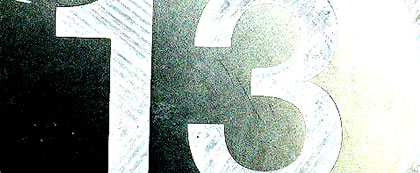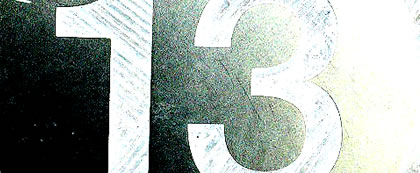
Ironically, fear of Friday the 13th, along with the number 13 and bad things happening in threes, comes third in the list of superstitions Americans are most likely to endorse (9%; Vyse, 1997). It is only beaten by black cats crossing your path (endorsed by 14%) and walking under ladders (endorsed by 12%). But, where does this fear of Friday the 13th come from and is it justified?
The origins of triskaidekaphobia, fear of the number 13, are thought to go back at least to medieval times, perhaps further, to the Romans. Some suggest the unlucky association comes from Christianity: at the last supper Christ dined with his twelve apostles, so altogether there were thirteen.
Fear of Fridays is thought to come from the Christian belief that it is the unluckiest day of the week because Christ was crucified on Good Friday. Also, Scanlon et al. (1993) report many other regional fears about Fridays: apparently you shouldn’t cut your hair or nails or call a doctor for the first time (it means certain death).
Unlucky drivers
Back in 1993 a group of researchers decided to meet this superstition head on with cold-headed empiricism. Scanlon et al. (1993) used three measures to try and work out if Friday the 13th is really unlucky for some, comparing each of the following figures with the previous Friday. They looked at the number of shoppers in supermarkets, vehicles on the motorway and hospital admissions from accidents.
They found that on Friday the 13th fewer people were driving and there were more transport accidents despite there being less vehicles on the road. People were, however, undeterred from shopping. Surprise, surprise.
Spooky? Maybe not. Along with the authors themselves, critics have pointed to a tiny sample and the fact that this is just one study.
Let’s try again
In a larger sample, Nayha (2002) used data from deaths between 1971 and 1997 in Finland for how many people died in traffic accidents on Friday the 13th compared to other Fridays. They found that for men, Friday the 13ths were no more dangerous than any other Friday. But for women there was actually a much higher chance of dying in a traffic accident – the risk was raised by a massive 63%.
Before we all jump to sexist conclusions about dangerous, superstitious female drivers there’s bad news for Nayha’s study. Radun and Summala (2005), reanalysing the data, found no such effect. They argue that Nayha’s results were just a statistical anomaly. Back to the drawing board on that one.
Still waiting for the answer…
So, it seems we’re still waiting for solid evidence that Friday the 13th is really as unlucky as both tradition and superstition would have us believe. Perhaps because of the well-known bias against reporting non-significant or negative results, there is really evidence out there that Friday the 13th is quite safe but it is just not being published. Meta-analysis anyone?
Either way I hope blogging on Friday the 13th won’t bring me any bad luck. Fingers crossed. Touch wood.
(Scanlon et al.’s (1993) research, published in the British Medical Journal, comes right after a report in the decline of doctor’s wardrobes. In particular, it bemoans the disappearance of bow ties, because they are considered more hygienic than their longer cousins. This isn’t relevant, it just amused me.)
 References – Click here to toggle visibility
References – Click here to toggle visibility
Radun, I., & Summala, H. (2005). Females do not have more injury road accidents on Friday the 13th. feedback.
Scanlon, T.J., Luben, R.N., Scanlon, F.L., & Singleton, N. (1993) Is Friday the 13th bad for your health? British Medical Journal (Clinical research ed.), 307(6919), 1584-6.
Vyse, S. (1997). Believing in Magic: Psychology of Superstition. Oxford: Oxford University Press.

